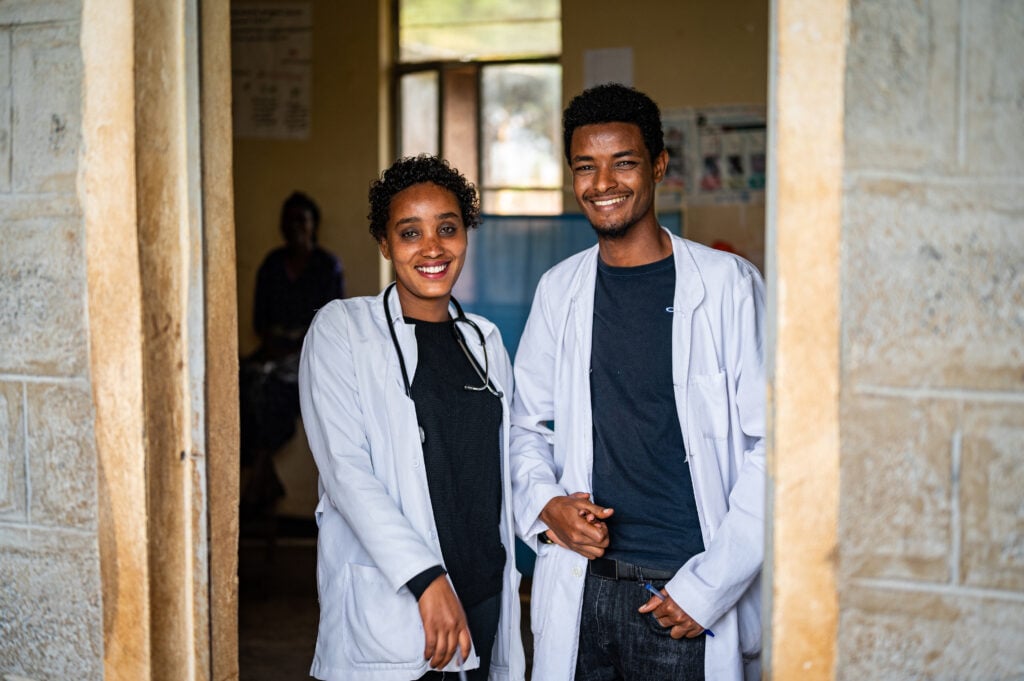Following years of advocacy efforts, the Netherlands published the first draft of its global health strategy: Working together for health worldwide. Cordaid has been proactively engaged in the development of the strategy. Rosana Lescrauwaet, Cordaid’s advocacy officer and global health expert, examines the first draft.

Back in 2020, the world learnt the hard way that it was unprepared to face global health threats. Since then, the Dutch Global Health Alliance, which Cordaid co-founded in 2020, has been advocating for the Netherlands to adopt a global health strategy.
A much-needed strategy for global health
To this date, COVID-19 has claimed 6.6 million lives worldwide. And half of the world’s population still does not have access to basic healthcare. It goes without saying that the stakes are high for this Dutch global health strategy.
The idea of global health strategies is not new. Several European countries have already strategised their commitments to global health. And the European Union is currently working on its very own global health strategy. Rosana Lescrauwaet, who also chairs the Dutch Global Health Alliance: “We cannot wait for another pandemic to learn from our mistakes again. We simply can’t afford that.”
The Netherlands’ ambition for global health
“The Netherlands is uniquely placed to contribute to global health”, Rosana explains. “Historically, they are one of the largest global health donors worldwide. They have consistently invested in global health initiatives, be it to tackle epidemics or advance sexual and reproductive health services for all.”
The Netherlands is a board member of some of the largest global health initiatives worldwide, including The Global Fund, Gavi and the Global Financing Facility.
For Rosana, the Netherlands has a lot to contribute to global health. “In addition, within the Netherlands, there is a lot of knowledge on how to ensure that health systems work in the interest of people and communities. There are think tanks, universities and the Dutch Global Health Alliance which pools knowledge and expertise from Dutch CSOs.”
The government has been consistent with its engagement with Dutch civil society organisations, which means it has also consistently committed to placing communities and human rights at the centre of its actions. “It is important that the Netherlands has a solid global health strategy. One that is holistic and based on principles of equity, human rights, do no harm and leave no one behind.”
Strengths and weaknesses
“There are several points in the draft that Cordaid welcomes, especially placing health systems strengthening at the heart of the strategy.” Ensuring health systems are strong and resourceful is a key pathway to achieving several health goals. Such as making sure they can respond to epidemics and pandemics and have strong services for mental health and sexual reproductive health.
“However, to make a global strategy truly ‘global’, you cannot omit fragile and post-conflict context. And that was missing in the current draft of the strategy.” Considerations for and expertise on fragile contexts are observed in other Dutch policy areas. For example, Minister Schreinemacher’s Trade and Development Aid policy framework includes a focus on regions of the Horn of Africa, Sahel, and MENA.
Gender is another critical factor that needs more focus in the strategy. “Gender inequality is one of the strongest barriers preventing people and communities who are marginalised to access health care. While the strategy acknowledges inequalities, there needs to be a stronger response to gender inequalities in the strategy”.
What’s next? Turning words into deeds
“Overall, this strategy is a positive first step. The next step is for the Netherlands to turn its words into deeds. Good intentions alone will not change the reality. As it is now, this strategy lacks clear implementation plans and accountability mechanisms.” Rosana believes that without a monitoring framework, this strategy could very well end up being nothing but an empty promise.
This first draft was just the first step taken by the Netherlands to strengthen the country’s approach to global health. Cordaid, along with the Dutch Global Health Alliance, will continue to monitor the development of the Dutch Global Health Strategy.
For Cordaid’s analysis of the content of the Dutch Global Health Strategy, read this policy brief.